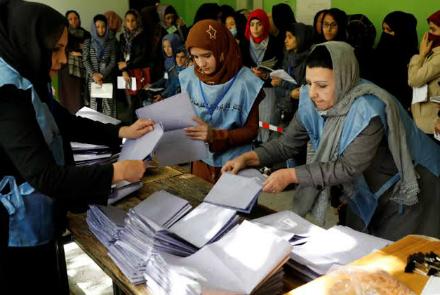Some parliament members, and officials from the Political Committee of the Political Parties, on Monday said that the recent security report by the Afghan security institutions labeling 431 centers as “too dangerous” is suspicious.
The Independent Election Commission (IEC) in a report on Friday said that 431 polling centers are to remain closed on election day due to insecure regions in the country. 5373 is the total number of centers considered.
According to the report, another 1,000 centers, although intended to remain open, face high-security threats.
Critics argue that most of the polling centers in Afghanistan’s central and southern regions are located in areas where the insurgents have a strong presence, however, the number of closed polling centers doesn’t seem to reflect this.
For example:
31 centers in Badghis, 29 in Badakhshan, 89 in Balkh, 12 in Baghlan, 14 in Takhar, 7 in Jawzjan, 11 in Sar-e-Pul, 20 in Samangan, 66 in Ghor, 46 in Faryab, 11 in Farah, 3 in Kapisa, 7 in Kunduz, 5 in Kandahar, 20 in Nuristan, 29 in Herat and 31 centers in Maidan Wardak will remain closed on the day of elections.
“There are some provinces where we have not closed centers and this is for two reasons: First, either the security assessment at the provincial and local levels wasn’t carried out in the right way. Or, second, it was a mistake. We hope to come up with more authentic and credible security assessment to avoid a potential political issue,” said Yousuf Rashid, head of the Free and Fair Election Forum of Afghanistan (FEFA).
“There are districts that are under siege and it is impossible to conduct elections there, and this will pave the way for fraud. From four districts, elections will be held only in the center,” said Gul Ahmad Noorzad, a member of parliament.
A lawmaker from Kunduz province said that Kunduz’s Kharwar district is under the control of the Taliban and that the elections will be held in some small areas of Charkh, Baraki Barak and Mohammad Agha districts, which are under the control of the Afghan government.
“They have added more suspicious sites and it’s very difficult to determine whether this place is under Taliban control or anyone else. In insecure provinces, you know that all areas are under the Taliban control except the center of the province, or center of the districts, so this indicates that efforts are underway for systematic fraud there,” said Ziauddin Zia, a member of parliament.
“When someone announces that areas are insecure, without any logical reason, and close to the polling centers, their intention is to engineer the elections or deprive the people of those regions from voting,” said Mohammad Natiqi, head of the Political Committee of the Political Parties.
The election commission last week said that 675 centers face high-security threats and another 907 centers are under medium threats.
The Afghan presidential election is scheduled for September 28.
The US embassy in Kabul has also called for transparent elections.
“We call on #Afghan electoral and security bodies to take every measure possible to ensure a safe and transparent election that is credible to the Afghan people,” the US Embassy in Kabul tweeted.
“Disturbed by so many complaints about security, lack of an equal playing field and fraud. We urge all candidates to adhere to the @AfghanistanIEC Code of Conduct and respect Afghanistan’s democratic process,” said the embassy.
Meanwhile, an Afghanistan Analyst Network (AAN) survey found that security has been deteriorating in the western province of Herat with the government and Taliban continuing to hit each other hard, particularly in districts farther from the provincial capital.
Based on the survey, insecurity, together with disillusionment after the previous mismanaged elections, is likely to result in fewer voters going to the polls on September 28 compared to past elections.
The survey also indicates that Taliban insurgents have employed different tactics to undermine the government in Herat province. Southern districts such as Adraskan and Shindand have been insecure for a long time, for example.
“Insecurity and the general lack of interest in the coming elections suggest that polling might significantly decrease for the looming September 28, 2019 presidential elections in Herat province. As of September 22, almost a week before polling day, the number of open polling centers has dropped from 300 to 268, of which 70 are under “high-security threat” in districts across the province,” said the AAN report.
The United Nations Assistance Mission in Afghanistan (UNAMA), and the Election Support Group of Ambassadors, held a meeting with presidential candidates to discuss their role in contributing to a transparent electoral process. The ambassadors encouraged all efforts to strongly encourage Afghans to go to the polls and elect their future leadership, and “noted the concerns expressed by several candidates about the level playing field and improper use of state resources to influence and/or co-opt voters, which erode public confidence in the fairness of the process,” UNAMA said in a press release.
The Election Support Group of Ambassadors reiterated that the credibility of the election is the collective responsibility of not just the electoral institutions, but all Afghan stakeholders including candidates.


Comment this post